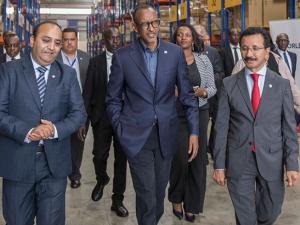
Rwanda targets share of Africa’s logistics market
President Paul Kagame on Monday officiated at the launch of Dubai Ports (DP) World Kigali Logistics Platform, a new modern inland cargo handling facility expected to ease trade of goods and add impetus to Rwanda’s bid of becoming a regional logistics hub.
The new facility, which was established under a public-private partnership framework, is a result of a 25-year concession agreement signed in 2016 between the Government of Rwanda and DP World, a United Arab Emirates-based firm.
The platform is a customs-controlled facility spread over 13 hectares and features an Inland Container Terminal (ICT) with modern warehousing capacity, a container yard, administrative and services buildings and parking areas.
While officiating at the inauguration of the facility, Kagame spoke about the future of trade in Africa and the crucial role that such infrastructure facilities will play.

Some of the forklift trucks outside the DP World Kigali Logistics Platform. Photo: Village Urugwiro.
He particularly indicated that the future of trade and integration on the continent lies in the power of the African Continental Free Trade Area, under which trading activities are expected to commence in July next year.
However, he said, trade agreements and economic policies alone won’t have much impact without actual infrastructure.
“With the launch of this facility, Rwanda is doing its part to connect with the larger market of more than 1.2 billion consumers in Africa and beyond,” the President noted.
“The Kigali Logistics Platform is really getting up and running, at a pivotal moment in our continent’s economic transformation.”
The Head of State challenged business people and investors, especially the industries located in the neighbourhood and those from the region and beyond, to make full use of the facility.
“There is no excuse not to pursue the vast opportunities available to us,” he said.
Sultan Ahmed Bin Sulayem, the Chairman and the Chief Executive Officer of DP World Group, which operates the port, said they have set their sights on the entire regional market.
“When we were telling people that we will reach the Central African Republic, Burundi, Malawi, and, of course, Tanzania and Kenya, people asked why? It is something we believe in and something we are good at,” he said.
He alluded to the company’s initial operations in Dubai, which started as a port operator before being transformed into a global logistics provider.
“We are not only handling cargo, but we are also working beyond the gate. We have 82 terminals around the world, from dry ports to fully-fledged ports,” he stated.
Logistics is about reducing the cost of transportation, he said, adding that the firm has developed a block chain technology platform used in supply chain management as it “pursues smart trade”.
The $35 million facility has the capacity to handle 50,000 containers and 650,000 tonnes of warehousing capacity.
The facility is expected to reduce the truck-turnaround number from an average of 10 days to three days, significantly bringing down the cost of doing business.
Rwandan traders still grapple with the high cost of shipping cargo in and outside Kigali, but the new platform could contribute to addressing inland logistics problems, delays and costs.
For instance, while the cost of transporting a 20-foot container from Shanghai in China to Mombasa, Kenya is anywhere between $500 and $1,000, the cost of transporting the same container from Mombasa to Kigali varies from $3,000 to $4,000.
The new facility will help decongest MAGERWA, which handles the majority of Rwanda’s imports and exports.
However, weak infrastructure and inefficient processing of goods are some of the challenges that still affect trade, according to private sector operators.
Fred Seka, the President of the Federation of East African Freight Forwarders Associations (FEAFFA), told The New Times that the new facility comes at a time when production output has been increasing, which he said demands more port services.
“What is clear now is that new investors have enabled more production activities to increase. What this means is that there is a need for more transport, clearing and storage services, which the facility is providing,” he said. “The platform operates fully as a port service, quite different from the existing handling facility (MAGERWA). MAGERWA has been there for more than 49 years, and it is unable to deal with the increasing demand for such services.”
By operating fully as a port, Seka says that traders are now able to get more services.
This includes cargo clearing, transporting, as well as storage and warehousing.
This, he noted, brings about transparency in pricing and efficiency since the traders are not dealing with multiple parties.







